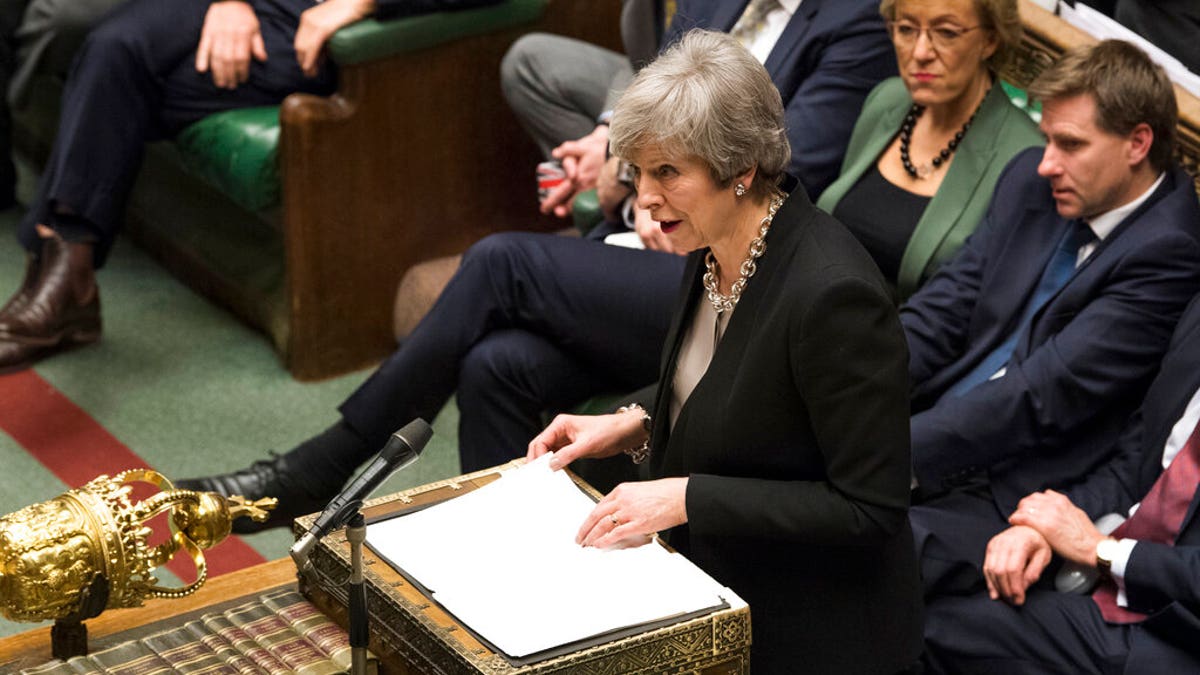
Britain's Prime Minister Theresa May reacts as she addresses the H
ouse of Commons Parliament during the debate on Britain's Brexit European Union Withdrawal Act, in London, Tuesday Jan. 29, 2019.(Jessica Taylor/UK Parliament via AP)
The British Parliament on Tuesday shot down an effort to delay Brexit in the event there was no deal with the European Union, and voted to say it could support Prime Minister Theresa May’s Brexit deal with some changes -- as the country moves closer to its formal exit from the E.U. at the end of March.
An amendment put forward by Labour Party MP Yvette Cooper would have delayed Brexit by nine months if no agreement was reached with Brussels by the end of February, a month before Britain is due to leave the E.U. on March 29.
BREXIT SUPPORTERS FEAR BETRAYAL AS PRO-EU FORCES CALL FOR DELAY, DO-OVER
The amendment was the pro-Remain bloc’s strongest push to delay Brexit to date, and pro-Brexit voices feared it was the first step on a path to ultimately overturning the referendum. However, it was voted down 321-298 amid a series of amendments voted on Tuesday afternoon -- marking a significant defeat for those seeking to keep Britain in the E.U. or delay its exit.
Labour MP Chuka Umunna, who has pushed for a second referendum, told Sky News that the torpedoing of the Cooper amendment, and another similar amendment, represented “a bad day for Parliament.”
“It has robbed Parliament of the opportunity, the wide canvas to give us to work with to prevent that no deal from happening, and we’ve got a government which has basically been taken hostage by the right wing of the Conservative Party that is quite happy for that scenario potentially occurring,” he said.
May’s withdrawal agreement, negotiated with Brussels last year, was overwhelmingly voted down earlier this month by the House of Commons, leaving the U.K. on track to leave with no such deal and therefore revert to World Trade Organization terms -- something that those in favor of remaining in the E.U., business groups, and even some in May’s government have said would be unacceptable and lead to chaos throughout Britain.
THERESA MAY'S ALLIES KEEP HER IN POWER BY WARNING OF HARD-LEFT TAKEOVER IF SHE FAILS
Hardline Brexiteers have dismissed predictions of long lines at borders and food and medicine shortages as exaggerated talk designed to delay and ultimately overturn the 2016 referendum, in which more than 17 million Brits voted to leave the bloc.
But in a win for the prime minister, MPs also voted for an amendment by Conservative MP Graham Brady, which said that the House would support May’s deal if she was able to secure changes to the “backstop” -- a controversial safety net by which the U.K. will remain in a customs union until a trade deal with the E.U. was secured.
The backstop is intended to avoid a hard border between Ireland and Northern Ireland, but so-called “Brexiteers” have pointed to the lack of a unilateral exit mechanism as evidence that the backstop could lead to Britain never leaving the bloc. While those in the pro-Brexit faction balked at other parts of her deal, their key objection was the backstop, and its removal allowed them to vote for the Brady amendment.
May told Parliament after the vote that “it is now clear that there is a route that can secure a substantial and sustainable majority in the House for leaving the E.U. with a deal.”
“We will now take this mandate forward and seek to obtain legally binding changes to the Withdrawal Agreement that deal with concerns on the backstop while guaranteeing no return to a hard border between Northern Ireland and Ireland,” she said.
CLICK HERE TO GET THE FOX NEWS APP
Former Foreign Secretary Boris Johnson, who resigned last year in opposition to the backstop and May’s agreement, described the amendment’s passage as “a victory for the prime minister, but also it’s a victory for the U.K.” as it allows May to return to Brussels stronger to negotiate changes.
However, any such negotiation attempt is likely to be treated coldly by E.U. officials, who have repeatedly ruled out a renegotiation. A spokesman for European Council President Donald Tusk told Reuters that the backstop was part of the withdrawal agreement, and therefore was not up for negotiation.




















